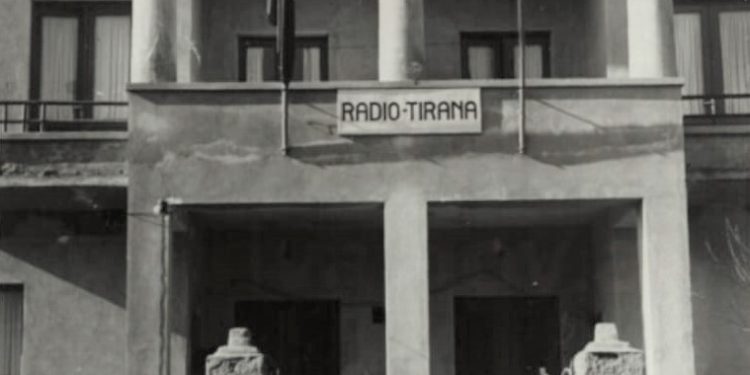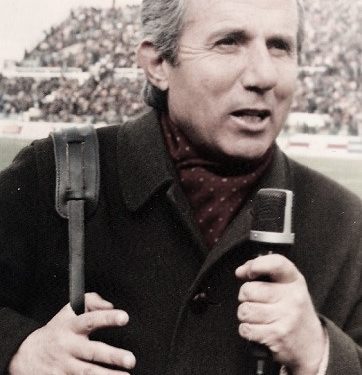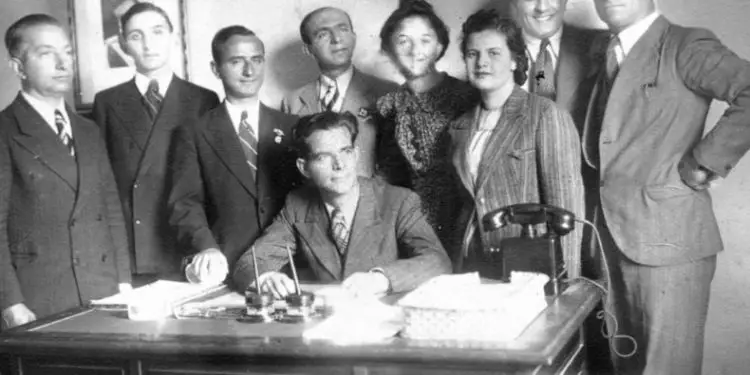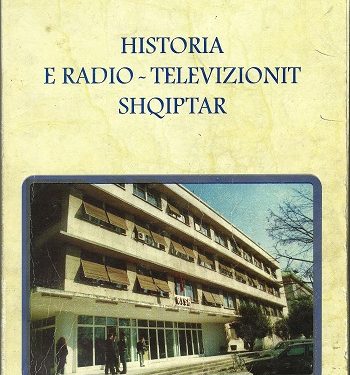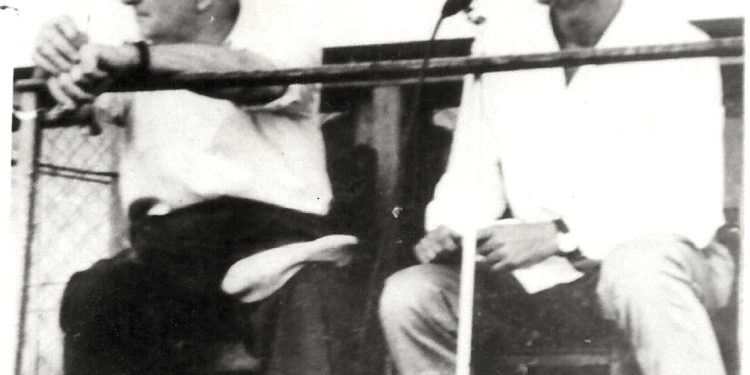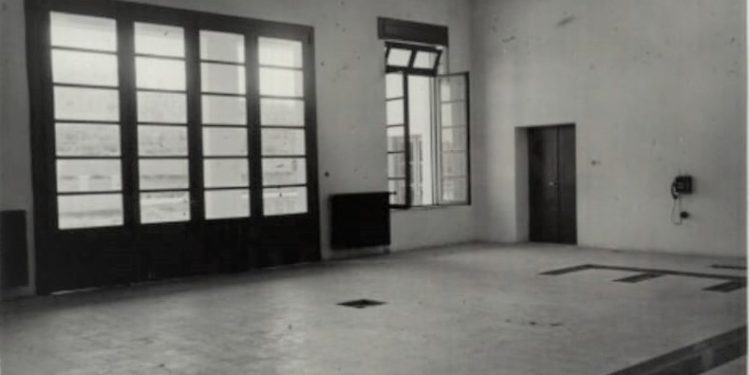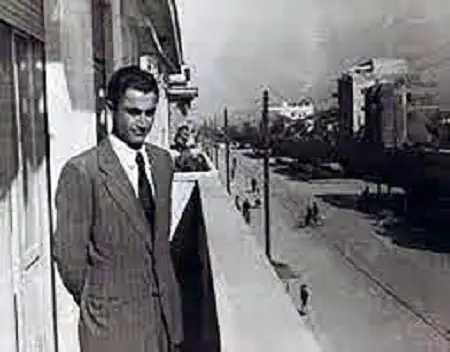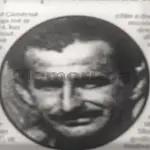From Skifter Kelliçi
The third part
Memorie.al/ On November 28, 1938, on the occasion of the Independence Day, in a ceremony attended by important authorities of the country, with a speech held on the microphone of Radio Tirana, King Zog the First inaugurated the establishment of this the institution, which over the years became so beloved and popular even for Albanians abroad. On this occasion, we are publishing the dossier ’85 years of Radio Tirana’, prepared by journalist and writer Skifter Këlliçi, who worked for 40 years at Radio Tirana (1959-1999), first as an editor and then as a sports commentator.
Continues from last issue
Radio – Tirana during the days of the war for the liberation of the capital
Radio – Tirana regularly continued its programs until October 27, 1944, when the forces of the National Liberation Army started the battle for the liberation of the capital. Until November 17 of that year, the building of Radio – Tirana was put under the strict control of a unit of the German army. She kept watch without interruption for any possible information from the partisan forces.
According to the memories of Islam Prosek, one of the oldest employees of Radio-Tirana’s phonotheque, it was learned that the Germans, on the run, had decided to blow up its building. Then measures were taken to preserve the music fund, in more than 2,500 discs, which was a real asset, by any means. For this purpose, he was escorted secretly through the houses of Tirana citizens, around the Radio building.
Also, the Italian engineer, Galeaci, dismantled those possible parts of the apparatus, which were transported to the house of the family of the future composer, Nikolla Zoraqi, also near the Radio. In order to avoid any intention of the invaders to blow up the Radio building, again according to the memories of Islam Prosek, Mihal Ciko, who continued to be the head of the music sector, since he spoke German, met with superiors of the German command?
“In very difficult conditions, when he felt that the bullets were flying near him, – remembered his friend, Evanthi Zoraqi, (Ciko), – he, crossing the great Boulevard of Tirana, passed the ‘Dajtin’ hotel, today’s building Prime Minister’s Office and reached the German command. During the meeting, he requested that Radio Tirana not be blown up.”
It is not known in detail whether this was the reason that really saved Radio-Tirana from destruction, or the pressure of partisan attacks, which were not shared with the invaders in every corner of the capital. But the fact remains: Radio-Tirana did not suffer the unfortunate fate of being destroyed. Not only that, but everything was done to get it. It was for this reason that, to dislodge the invaders, the 2nd company of the 3rd Battalion, of the 1st Brigade, with commander Mane Sevranin, was assigned.
“The radio, as Mane Sevrani himself testified, was guarded by 9 gendarmes and 7 German soldiers. Two of the gendarmes went to get food at the restaurant of the “International” hotel. They were caught by the partisan forces and agreed to call the gendarmes others, to surrender, because they would not suffer anything. And so it happened.
At dawn on November 14, the gendarmes left quickly and when two more Germans started to take the food, the partisans who had surrounded the Radio-Tirana building, from “Rruga e Durres” and “Rruga e Kavaja”, started the attack. Two Germans were killed and the others taken prisoner. In this way, Radio – Tirana was put under the control of partisan forces”.
Immediately, on November 17, 1944, which was also the day of the liberation of Tirana, the commander of the 1st Corps, Major General Dali Ndreu, authorized technician Todo Bojdani and Italian engineer Antonio Galeaci to take over Radio-Tirana and ordered to create all facilities for collecting tools in different places”? (According to a document kept in Todo Bojdan’s house).
In the article entitled “From the history of Radio-Tirana”, published in the magazine “Radio-programi”, on April 12, 1951, it is written: “In the building of Radio-Tirana, only two transmitters were found, which the occupier had undermined and were about to blow them up. But he didn’t. Several important parts of the short-wave radio transmitter were damaged and inoperable, while the medium-wave one had a number of bulbs removed and broken. In 10 days they were fixed and On November 28, 1944, Radio-Tirana started its regular broadcasts for the outside world as well”.
First broadcasts after liberation
Unfortunately, for this important period of Radio-Tirana, archival documents are missing. The press does not help us either, because the only newspaper of that period “Bashkimi”, which replaced the newspaper “Bashkimi i Kombit”, published during the period of the German occupation, came into circulation only at the end of December 1944. However, this period is illuminated by the memories of Dhora Leka, Xorxia Haxho, Liri Bozo, (Kito), Refik Bezhani, Findia Veiz, Stefanaq Pollo, etc.
Dhora Leka and Refik Bezhani testify that coming from the ranks of the National Liberation Army; they were assigned to work at Radio-Tirana, immediately after the liberation of the capital. Together with the well-known musician Mihal Ciko, the tireless Italian engineer, Antonio Galeaci, the technicians Spiro Qirko, Todo Bojdani, etc., every day, from November 21, they did the first broadcast tests, which we succeeded. On November 27, everything was ready.
In a material stored in the RTS archive, entitled “Data from the history of Radio Tirana”, it is emphasized that; The radio opened its broadcasts on November 28, 1944, with the speech delivered by Enver Hoxha in front of the “Dajt” hotel, on the occasion of the parade of the partisan forces that had liberated Tirana, with which he addressed the residents of the capital, who had flocked to two sides of the “Martyrs of the Nation” boulevard, and the entire Albanian people.
Always according to the memories of the above-mentioned, on the morning of November 28, they, together with Fatmir Gjata, (author of the lyrics of many partisan songs) and Mark Gurakuqin, a young writer, all three partisans, prepared the reportage of the parade of the partisan forces.
“Of course,” recalled Dhora Leka, “we spoke in front of the microphone as we knew how, but I, knowing closely the important cadres that were passing by, tried to make a description as realistic as possible. “While I, added Refik Bezhani, read slogans about war and victory against the invaders”.
As Llazar Morcka, a young partisan and then a well-known composer, testified, after the broadcast of the parade of the partisan forces, Radio-Tirana continued its programs with a concert of Albanian songs, where, apart from him, Koço Timko, Koço and Nesti Uçi, Hysen Pelingu, etc., who would later become well-known, figures of our musical art.
The radio shows were followed by a commemorative afternoon dedicated to the martyrs, organized exactly where the Skanderbeg memorial is today, in the square with the same name.
And how did the program of the first day of Radio-Tirana continue?
Unfortunately, no one can testify because its first director after liberation, Petro Kito, well-known technicians Todo Bojdani, Spiro Qirko, Xhafer Zavalani and writers Fatmir Gjata, Mark Gurakuqi, are no longer among us. They could also give us interesting information about the programs of other days of Radio-Tirana.
Only on December 25, when, as we said, the newspaper “Bashkimi” began to be published, we became familiar with the programs of Radio-Tirana. Here is her daily program: 19.00 – foreign news; 19.15 – internal news; comments and personal messages; 19.30 – Baba Faja Martaneshi speaks; 20.00 – “Partisan Hour; 20.30 – connections with the “Kosova” theater, to broadcast a vocal-instrumental concert. On shortwave from 20:00-21:30, news in French, Serbo-Croatian, Italian, Greek, Albanian.
Thus began a new period for Radio-Tirana. Although it became a powerful tool to propagate the communist ideology, it remained a tool that was increasingly introduced into every Albanian home.
The arrest and punishment of Gjergj Buban
As we have pointed out, Gjergj Bubani was the first director of Radio Tirana, a very cultured man. He had finished his higher studies in Athens for Industrial Chemistry, but abandoned the laboratories in this field, and settled in Bucharest, at the invitation of Viktor Eftimiu, the Albanian-Romanian writer, to devote himself to journalism.
He was a master of four foreign languages (Romanian, Greek, French and Italian), and, above all, a well-known publicist, founder of the newspaper with the meaningful title “New Albania” and author of many writings, on the national issue that even today deserve attention. With this experience, he had returned to his homeland, playing an important role in the progress and quality improvement of Radio-Tirana’s broadcasts.
Without waiting, he, who had been suspended from work since the fall of 1943, after replacing the Italian invaders with the German invaders, was arrested on the charge of “traitor to the motherland and collaborator with the invaders”, along with 59 intellectuals, from the most prominent of the time. And with this charge he was presented at the “Special Trial” held in March-April 1945, at the “Kosova” Cinema-Theatre, in Tirana.
However, during the court process, the opposite was proven. For this, it is enough to mention the testimony of Kaliopi Prifti, former technician of Radio-Tirana, and then editor, who, among others, testifies as follows in the court session of April 12, 1945:
“I know about Buban, within the walls of Radio.
In 1941, I knew this and he knew that there were people from the Movement, almost all of them, on the Radio, and he did not take any measures. This was in the time of fascism. This justified the absence of employees, when they were not in the office, and gave them their salaries. When the Germans came, he said that we must be careful because they consider Radio as a communist nursery”.
This fact is reinforced by the other witness Naum Naumi, who also affirms: “I know Gjergj Bubani as a sympathizer of the Movement, as early as 1943, when I was released from prison after the capitulation of fascist Italy. I know that Gjergj Bubani advised on this occasion many Italian officers went to the mountain, such as Captain Rampi”. (This was the conductor of the symphony orchestra of Radio Tirana, my note, S.K.; from the newspaper “Bashkimi, April 13, 1945).
Surprisingly, the jury, composed of Koci Xoxe, chairman and Halim Budo, Gaqo Floqi, Hysni Kapo, Beqir Balluku, Medar Shtylla, Faik Shehu, Gjon Banushi, Bilbil Klosi, members and prosecutor Bedri Spahiu, sentenced Gjergj Buban to 15 years of imprisonment, sentence which was changed to 6 years. At the end of his sentence, Gjergj Bubani, sick, died at the age of 56, as a result of the difficult conditions in prison. Not only that, but for about 50 years, his great help, as well as that of the entire team of Radio-Tirana, from 1938-1944, remained in complete oblivion.
Other victims of the dictatorship, on Radio Tirana
At the Tirana Conference, held in April 1956, Vehip Demi, head of programming and member of the party bureau at Radio-Tirana, on behalf of the party organization of this institution, held a discussion, where, among other things, said: “We must openly admit that we are shy, afraid to express their opinions, to criticize freely…!
We want to ask the Minister of Trade, Comrade Kiço Ngjela and the Minister of Finance, Comrade Abdyl Këllezi, where do the funds needed to cover the ‘Block’ come from?! In which capital of the budget do they enter?! We need to talk a lot about the Bloc issue. We cannot hide this. We, as communists, do not know how to clarify, because we ourselves do not see the existence of the Bloc as right”. (State Archive, Tirana Party Committee Fund, file A,A /1.A/2,1956).
Vehip Demi, like other discussants who expressed themselves so bravely in this conference, after its conclusion, by order of Enver Hoxha, were imprisoned or exiled. There were those who also found death, like Vehip Demi. While the other members of the bureau, Skënder Tupja, Findia Veizi, Koço Afezolli, Masar Bekteshi, were removed from Radio and its director, Petro Kito, was given a severe warning, although he was on duty outside Albania at that time.
In 1963, for an escape attempt, the two talented journalists of Radio Tirana, Fadil Kokomani and Vangjel Lezho, were arrested and sentenced to 25 years in prison, who were re-sentenced in 1979, by firing squad, a decision that was executed on May 29 of that year. The reason was that, although they knew they would be sentenced to death, after 16 years spent in terrible communist prisons, they sent a letter to the members of the Political Bureau of the ALP, where they emphasized that Enver Hoxha was isolating Albania from the world.
A year later, another journalist from Radio-Tirana, Abdulla Sallaku, was also sentenced to 18 years in prison for trying to escape. In 1973, after being expelled from the Central Committee and the Party in the infamous 4th Plenum of PPSh, Todi Lubonja, general director of RTSh, described by Enver Hoxha himself, was imprisoned. “Enemy of the Party and the people, who sought to distort the orientations of the party, trying to turn RTSh into an entertaining institution”!
That same year, after being sent to work as a construction worker in Ballsh, the talented director Mihal Luarasi, artistic director of VATS, was arrested and sentenced to 15 years in prison. Accusations; “had staged the 11th Song Festival in RTSh”, qualified performance; “with bourgeois-revisionist influences, contrary to the tastes of the masses of the people and the demands of the Party and… Comrade Enver Hoxha”.
In 1975, the journalist of Foreign Radio, Gramos Mborja, was also imprisoned, and the well-known speaker Kiço Fotjadhi was removed from RTSh. In 1986, the talented radio-telechronist, Timo Luto, suffered the same fate. Both for political reasons. Only after a few years they returned to RTS.
In fact, the first one was finally removed from the microphone and camera, even after the fall of the communist system, because…he had been the speaker of Enver Hoxha’s works! No press organ, or institution, has been hit so hard by the communist dictatorship, than Radio-Tirana and then RTSh!
Radio Tirana enriches the programs
But let’s go back to the historical developments of Radio-Tirana…! Based on the memories of its first employees, from December 1944 onwards, it appears that Radio-Tirana, although with difficulties, started to create new shows, which were liked by the listeners.
These were artistic shows such as; “Letterary Hour”, “Youth Hour”, “Radio Posta”, and then “Hilarious Hour”, which restarted on September 15, 1945, with the same success as it had in the 40s, when it was directed by the comedian and the talented musician from Shkodran, Pjetër Gjini, who after the liberation was arrested and disappeared without a trace.
“Hilarious Hour”, was broadcast live every Sunday at 13.00. I was young at the time, but I don’t forget that people left the squares and streets and wherever they were, ran home to listen to this comedy show. Actors Besim Levonja and Behije Çela, who later became husband and wife, played the role of Coni and Ishe, Prokop Mima, the role of Rema, and then Mihal Popi, Gjon Karma, Anton Pano played a major role in its success. , etc. The musical accompaniment of skits, parodies, couplets, etc., was done by young musicians, Llazar Morcka, Nesti Uçi, Koço Timko, and Hysen Pelingu.
On December 21, 1945, the sports shows were also restarted, prepared as always by Anton Mazreku. Even on December 20 of that year, he commented live with a microphone from the sports field of “Shallvares” the first football match after liberation. On March 26, 1946, another important event in the life of Radio-Tirana. With the piece “Mother”, by the Yugoslav writer Llovrič, the show “Teatri na microphone” starts, which immediately became one of the most watched shows for decades.
An important place in the radio programs was the news that was broadcast several times a day, as well as the political programs, among which, “We meet you with the Soviet Union”, “We meet you in the New Yugoslavia”, comments on the issues of the day, such as and conversations with an ideological, historical, social character, especially about the Red Army, Lenin, Stalin, Tito.
Music shows were also expanded, especially with popular music. The first singers who debuted on the microphone of Radio Tirana after the liberation were again; Tefta Tashko Tashko Koço, Marie Kraja, Jorgjia Truja, Kristaq Antoniu and singers; Merita Sokoli, Viktori Xhaçka, Kel Sata, with the Shkodran group, the saze group, without excluding the partisan choirs, etc.
As always, Mihal Ciko continued to work in the direction of the music sector. It must be said that all Albanian music programs were still broadcast live on the microphone, because the tape recorder had not yet entered the vocabulary of Radio-Tirana.
The exception was the use of a tape recorder, spoils of war, left over from the German army, of the AEG type.
As Emil Plumbi, first an editor at Radio and then, after finishing his studies, an engineer there, recalled, this tape recorder of the first series of productions of this device that would revolutionize Radio in the world, provided very useful services for recording broadcasts of Radio-Tirana in that period.
Of course, with the arrival of Soviet-made tape recorders in 1950, the quality, not only of artistic and musical shows, but also of all shows, increased significantly, because now they were recorded and then broadcast. Classical music also played an important role in the radio programs. Until 1949, it was stored on discs, from the time of the fascist occupation.
It was a great luck, as the old employee of the phonotheque, Islam Prosek, recalled, that a good part of them was not destroyed, because there were those who thought that, since it is “fascist” music, it should be destroyed. And it was about hundreds of discs that had been carefully preserved since the time of the War!
In order to understand the “mindsets” of some employees of Radio-Tirana in those years, it is enough to mention that, noting the popularity of “Radio Posta”, in one of the first issues of the magazine “Radio-diffusion”, which started it was published on September 1, 1947, it was written like this for classical music; “There are few listeners who are looking for classical music, with heavy melancholic tones.
And this, of course, in those cases, when the spiritual state of the listener is such, when he does not feel the joy of life enough and does not have, to the right extent, the belief that he will pass the unhappy state he is in…” A truly Trashanic interpretation of classical music… /Memorie.al
The next issue follows




